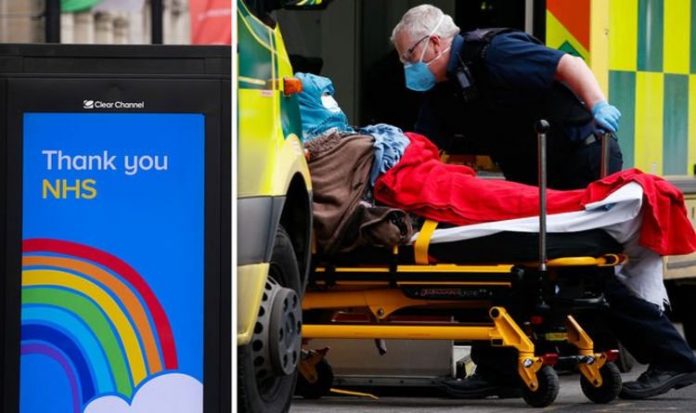The NHS is under intense pressure with thousands of non-Covid patients being forced to wait for treatment as the health service endeavours to manage urgent Covid cases and the mass vaccination efforts. Express.co.uk speaks with a health expert to discuss the impact of the coronavirus pandemic upon the NHS.
Earlier this month, Professor Chris Whitty said the next few weeks will be the worst of the pandemic.
He urged everyone to minimise socialising and said the public should not wait for any Government ‘tinkering” with rules, but instead should “double down” on the current restrictions.
Professor Whitty said: “Even within them [the rules], we should be doing our level best to minimise the amount of unnecessary contact with people who are not in our household. I can’t emphasise that enough.”
The chief medical officer told the BBC the NHS was facing its “most dangerous” point.
Professor Whitty said: “In London, for example, one in 30 people currently have this coronavirus, across the country as a whole, it’s one in 50.
“So this is a serious problem, and it’s rising in every part of England.”
READ MORE: BBC bias row erupts as Katya Adler accused of taking EU’s side
The third national lockdown in England was implemented at the beginning of January in a bid to avoid the NHS being overwhelmed.
According to the latest data from the Government’s coronavirus dashboard, 3,082 new patients were admitted to hospital on January 23.
In total, there are 37,605 patients in hospital, of which 3,961 are on ventilation.
NHS figures published on January 28 reveal 18 out of 140 major trusts were at 100 percent occupancy in their ICUs last week.
The data also showed ICUs were more than 70 percent busier than they had been at any time over the past five years.
Benenden Health CEO Bob Andrews said the UK is currently amid its most intense and serious period.
Mr Andrews told Express.co.uk: “As highlighted in recent reports, the increase in hospital admissions is the most critical issue the NHS is currently facing.
“The time lag from infection to hospitalisation means that despite the lockdown, more patients will continue to arrive until the lag effect plays through, meaning it is a crucial time for health services.
“Even before the pandemic, this time of year always sees high pressure placed on the NHS with flu and other winter issues.
“Covid-19 has accentuated the impact, resulting in non-essential activity being cancelled and more beds being allocated to critical care.
“Couple this with illness and self-isolation of NHS staff and you can see why the Nightingale Hospitals have not been able to take up the slack.”
DON’T MISS
Time to think the unthinkable and break up the NHS – DR SAQIB QURESHI [COMMENT]
Katya Adler hits out at EU over jab threats after lecturing world [EXPLAINER]
Covid new strain symptoms: People in their 20s in intensive care [INSIGHT]
Mr Andrews said the NHS has reached such a crucial juncture now because of the strain on the system on many fronts.
He told Express.co.uk: “The NHS has responded superbly to the need to increase critical care capacity but it is the relentless, sustained pressure which is putting the system under strain.
“Front line clinical staff have done an amazing job but the stress and ill health is now having an impact.
“The initial approach was an innovative collaboration between the Private sector and NHS which helped relieve pressure for a period of time but was never considered a long-term solution.
“It does beg the question about the option to consider a more sustainable solution around the purchase of private hospital capacity with either a regional or national approach.
“It has been really positive to see the private sector helping significantly throughout the peaks and troughs of the pandemic and I hope it will continue to do so in the country’s future recovery.”
According to official statistics, it is estimated three million people missed cancer screenings in 2020 as a result of coronavirus.
In addition, around two million patients waited more than 18 weeks for routine hospital treatment.
One in 10 mental health patients have been on the waiting list for help for six months.
Mr Andrews added non-critical care and elective surgery have been impacted by the pandemic.
He told Express.co.uk: “Non-critical care and elective surgery have all been impacted and wait times for these will have extended.
“However, there is also evidence that many people have chosen not to see their GP or seek diagnosis and treatment, rather than the opportunity not being available, which is also of concern.
“Both public and private healthcare institutions should encourage those in need of help to seek support.
“The NHS will do all it can, and it is our hope that others may turn to the private sector or health insurance to avoid potential waiting lists.”
READ MORE: Asthma teen died after NHS computer said no emergency
Mr Andrews believes the pandemic will require several years for the NHS to recover.
He told Express.co.uk: “I believe the NHS is too important and has shown amazing resilience but maybe what the pandemic has shown is that there needs to be a rethink around funding and structure (and action is being taken to make local care broader by consolidating the number of CCGs and bringing care budgets together).
“The NHS will not be allowed to fail and nor should it.
“I do believe it will take several years to recover from the impact of the pandemic, especially in some regions which already had significant health challenges such as high levels of obesity.
“This is why collaboration between the NHS and private healthcare must be de-stigmatised, and the conversation around future collaboration must continue once we come through the other side of the coronavirus crisis to support a full recovery and ensure people get the care when they need it through whichever path they wish.”







